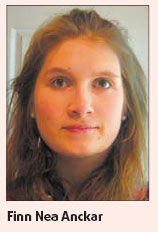Sixteen-year-old Zoheb Rahman says starting at his international school in Beijing last August taught him a powerful lesson about personal transformation.
"My whole world perspective has changed a lot," the 11th-grader at Western Academy of Beijing (WAB) says. "In my old school in Sweden, we were all the same here we share our thoughts about life and respect one another's cultures." Rahman has Indian parents but was raised in Sweden.
His classmate, Engler Sher, agrees that the diversity of her international school's student body is a huge boon. "You  get to see how students from all over the world look at different subjects like religion," the 17-year-old Israeli says.
get to see how students from all over the world look at different subjects like religion," the 17-year-old Israeli says.
"And you learn to be more open to other opinions, even if you don't agree with them."
Finn sophomore Nea Anckar, who came to WAB four years ago following a three month-stint at Yew Chung International School of Beijing, says it's not just that she's become more open-minded - she also appreciates that her classmates are as well.
Engler Sher says the diversity presented the greatest challenge to adapting to her new school.
Still, international schools' pedagogy is more advanced than her previous school, she says.
This led to something surprising for Rahman.
"My international school in Beijing is harder than my private school in Sweden, but my grades are better," he says. "Maybe it's because I have more fun and people are more focused."
Engler Sher believes the most important component of the curriculum is the foreign language requirement.
She's studying English and Chinese, and recalls her English was poor when she first came to WAB. "I had the tools but was afraid to talk a lot," she says in a perfect American accent.
While Anckar has studied with a tutor to keep up her Finnish, next semester she'll take Chinese B with students who have studied for at least six years.
Other curricular elements also provide greater challenges than typical schools in most countries, the students say. "They definitely prepare us for university better," Anckar says.
She says teachers and administrators start talking about university from 9th grade rather than in senior year like in Finland.
The accelerated learning's downside is that it drags on socialization, Engler Sher says.
"You kind of hang out with people less here than back home," she says. "I'm glad I got to go to international school. It opens doors for you; it really does."
For Rahman, this means being aware of possibilities he says he never would have dreamt of back in Sweden. "Now, I want to explore the world more," he says. "And I want more challenges in my life."
(China Daily April 13, 2009)